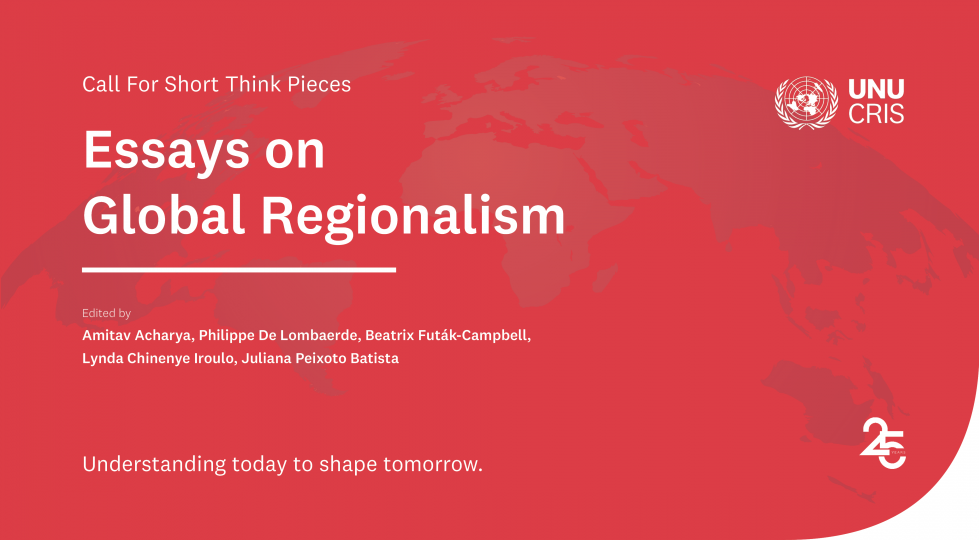Call For Short Think Pieces: Essays on Global Regionalism

Join a global reflection on how to globalise (comparative) regionalism studies, celebrating the 25th anniversary of UNU-CRIS
Edited by
Amitav Acharya, Philippe De Lombaerde, Beatrix Futák-Campbell, Lynda Chinenye Iroulo, Juliana Peixoto Batista
To celebrate 25 years of UNU-CRIS in 2025, a global brainstorming exercise is being organized to reflect on how regionalism studies as a discipline or area of study could be re-thought, re-shaped, or otherwise consolidated to strengthen not only its academic rigor but also its global relevance for the years to come.
Passionate debates are taking place around the world on global IR, decentering/decolonizing, nexus approaches, and related methodological and ideological debates in the social sciences, as well as the ongoing debates on the political relevance of regions and regional cooperation in today’s world.
Essays on Global Regionalism aims to empower and amplify many voices for a truly global debate with diversity in all its expressions, across genders, generations, ideologies, geography, regions, cultures, and disciplines.
These think pieces will reflect the diversity of opinions in our global community of regionalism scholars. At the same time, taking all the contributions together should allow us to present a balanced and nuanced account of regionalism studies. It should also allow us to move beyond (too?) simple categorisations such as Western/non-Western, global North/global South, Eurocentric/non-Eurocentric, critical/non-critical, and so on.
The exercise as a whole should be constructive, in the sense that it should provide building blocks for regionalism studies in the coming years by indicating what the relevance is of regions in current world politics, how a pluralistic theoretical and methodological toolbox to study regions could look like, how disciplinary boundaries can be bridged, and what the relevance is of comparative regionalism research. At the same time, the project investigates the possibility of constructive inter-regional dialogues on regionalism and regional cooperation.
The short contributions should ideally connect to one of the five sections in the envisioned book and the related guiding questions:
Section 1: What are the global origins of regionalism thinking?
- Guiding questions: Which ontologies/knowledge/theorizing have emerged and where? To what extent are Eurocentric understandings of regionalisms acting as ‘conceptual cages’ for thinking regionalisms elsewhere? To what extent are regional debates interlinked and concepts travelling?
Section 2: How relevant is mainstream theorizing (still)?
- Guiding questions: What are mainstream theories, and why are they mainstream? How context-specific or otherwise abstract are mainstream theories? To what extent have mainstream theories advanced knowledge of regions beyond where they emerged?
Section 3: What does the sociology of the regionalism scholarly community look like?
- Guiding questions: How is the scholarly community organized? How does the academic community condition regionalism theorizing? Are there schools of thought? How useful are categories like (non-)Western, (non-)Eurocentric, (non-)critical, etc? What roles do regional organizations play in promoting models of regional cooperation, and how do they contribute to shaping epistemic communities? How are contestations to dominant models being organized?
Section 4: What could/should global regionalism look like?
- Guiding questions: What is the role/ambition of theorizing in regionalism studies? How universal can theories be? Does the origin of theories matter? Is a common/shared theoretical ‘toolbox’ possible (even if compartmentalized)? How relevant and feasible is comparative research on regionalism? If so, what are adequate comparative methods? What methodological tools are indispensable for context-specific regionalism research?
Section 5: Will regions save the world?
- Guiding questions: How relevant is the regional concept for understanding world politics, economy, and the multiplex world order? For which policy challenges are regions better equipped to tackle than the nation-state? For which policy challenges are regional organizations better equipped to tackle than international organizations like the UN? How is regional actorness evolving? How do regions talk to their people and shape identities? Can regions be building blocks for stabilizing the global geopolitical system? Will regions be building blocks for a new multilateralism? Which future for interregionalism? Can regions be threats or agents of destruction if they are 'closed' or become spheres of influence under regional hegemons?
Expressions of Interest
Submit an expression of interest including: a working title, author(s), and indication of applicable section(s) to by completing this form at the earliest opportunity.
The editors will then invite the author(s) with a relevant and suitable contribution to prepare a full essay, for submission by the deadline below.
Format
Short essays (2000 – 4000 words)
Submission Deadline
1 August, 2024
Publication
Manuscript will be submitted to the UNU Series on Regionalism (Springer)
